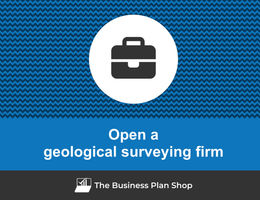How to create a financial forecast for a geological surveying firm?
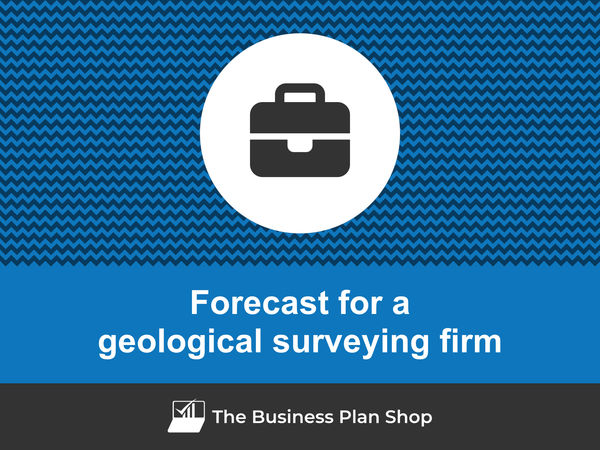
Developing and maintaining an up-to-date financial forecast for your geological surveying firm is key in order to maintain visibility on your business’s future cash flows.
If you feel overwhelmed at the thought of putting together a geological surveying firm financial forecast then don’t worry as this guide is here to help you.
We'll cover everything from: the main objectives of a financial forecast, the data you need to gather before starting, to the tables that compose it, and the tools that will help you create and maintain your forecast efficiently.
Let's get started!
Why create and maintain a financial forecast for a geological surveying firm?
Creating and maintaining an up-to-date financial forecast is the only way to steer the development of your geological surveying firm and ensure that it can be financially viable in the years to come.
A financial plan for a geological surveying firm enables you to look at your business in detail - from income to operating costs and investments - to evaluate its expected profitability and future cash flows.
This gives you the visibility needed to plan future investments and expansion with confidence.
And, when your trading environment gets tougher, having an up to date geological surveying firm forecast enables you to detect potential upcoming financing shortfalls in advance, enabling you to make adjustments or secure financing before you run out of cash.
It’s also important to remember that your geological surveying firm's financial forecast will be essential when looking for financing. You can be 100% certain that banks and investors will ask to see your numbers, so make sure they’re set out accurately and attractively.
Need a convincing business plan?
The Business Plan Shop makes it easy to create a financial forecast to assess the potential profitability of your projects, and write a business plan that’ll wow investors.

What information is used as input to build a geological surveying firm financial forecast?
A geological surveying firm's financial forecast needs to be built on the right foundation: your assumptions.
The data required to create your assumptions will depend on whether you are a new or existing geological surveying firm.
If you are creating (or updating) the forecast of an existing geological surveying firm, then your main inputs will be historical accounting data and operating metrics, and your team’s view on what to expect for the next three to five years.
If you are building financial projections for a new geological surveying firm startup, you will need to rely on market research to form your go-to-market strategy and derive your sales forecast.
For a new venture, you will also need an itemised list of resources needed for the geological surveying firm to operate, along with a list of equipment required to launch the venture (more on that below).
Now that you understand what is needed, let’s have a look at what elements will make up your geological surveying firm's financial forecast.
The sales forecast for a geological surveying firm
The sales forecast, also called topline projection, is normally where you will start when building your geological surveying firm financial forecast.
Creating a coherent sales projection boils down to estimating two key drivers:
- The average price
- The number of monthly transactions
To do this, you will need to rely on historical data (for an existing business), market research data (for both new and existing geological surveying firms), and consider the elements below:
- Natural disasters: The occurrence of natural disasters such as earthquakes, hurricanes, and landslides can greatly impact the demand for geological surveying services. These events can lead to an increase in demand for surveys and assessments of affected areas, resulting in a higher average price for services.
- Economic conditions: Economic conditions, such as a recession or a boom in the construction industry, can affect the demand for geological surveying services. During a recession, construction projects may be put on hold, resulting in a decrease in the number of monthly transactions for the firm. On the other hand, a construction boom can lead to an increase in demand for geological surveys, resulting in a higher average price for services.
- Technological advancements: Advancements in technology can greatly affect the efficiency and accuracy of geological surveying services. As new technologies emerge, clients may be more willing to pay a higher average price for services that utilize these advancements.
- Environmental regulations: Changes in environmental regulations or new laws can impact the demand for geological surveying services. For example, stricter regulations on building in certain areas may lead to an increase in demand for surveys and assessments, resulting in a higher average price for services.
- Competition: The presence of competitors in the market can affect the average price and number of monthly transactions for a geological surveying firm. If there is a high level of competition, the firm may need to lower their average price to remain competitive, resulting in a decrease in revenue and number of transactions. On the other hand, a lack of competition may allow the firm to charge a higher average price for services, resulting in a higher revenue and number of transactions.
After the sales forecast comes the operating expenses budget, which we will now look into in more detail.
Need a convincing business plan?
The Business Plan Shop makes it easy to create a financial forecast to assess the potential profitability of your projects, and write a business plan that’ll wow investors.

The operating expenses for a geological surveying firm
The next step is to estimate the costs you’ll have to incur to operate your geological surveying firm.
These will vary based on where your business is located, and its overall size (level of sales, personnel, etc.).
But your geological surveying firm's operating expenses should normally include the following items:
- Staff Costs: These include salaries, benefits, and training costs for your team of geologists, surveyors, and support staff.
- Accountancy Fees: As a geological surveying firm, you will need to hire an accountant to manage your financial records, file taxes, and provide financial advice.
- Insurance Costs: It is crucial to have insurance coverage for your business, including professional liability insurance, general liability insurance, and workers' compensation insurance.
- Software Licences: You will need to invest in software licenses for geologic mapping and analysis, surveying, and project management software to efficiently run your business.
- Banking Fees: This includes charges for maintaining a business bank account, wire transfer fees, and credit card processing fees.
- Rent: If you have a physical office space, you will need to pay rent or lease payments.
- Office Supplies: This includes stationery, printer ink, and other essential office supplies for your day-to-day operations.
- Travel Expenses: As a geological surveying firm, you may need to travel to different locations for fieldwork or meetings with clients, potential investors, or government officials.
- Marketing and Advertising: To attract new clients and projects, you may need to invest in marketing and advertising efforts, such as creating a website, attending industry events, or running online ads.
- Professional Memberships: Joining professional organizations and associations related to geological surveying can provide valuable networking opportunities and access to industry resources.
- Training and Development: To stay updated on the latest techniques and technologies in geological surveying, you may need to invest in ongoing training and development for yourself and your team.
- Telephone and Internet: Communication is crucial in any business, so you will need to budget for telephone and internet expenses.
- Utilities: This includes electricity, water, and other utilities for your office space.
- Legal Fees: As a business owner, you may need to seek legal advice for contracts, permits, and other legal matters, which may incur fees.
- Maintenance and Repairs: If you own any equipment, vehicles, or office space, you will need to budget for maintenance and repairs to keep them in good working condition.
This list is not exhaustive by any means, and will need to be tailored to your geological surveying firm's specific circumstances.
What investments are needed to start or grow a geological surveying firm?
Your geological surveying firm financial forecast will also need to include the capital expenditures (aka investments in plain English) and initial working capital items required for the creation or development of your business.
For a geological surveying firm, these could include:
- Geological Surveying Equipment: This includes items such as GPS devices, geological mapping software, and specialized tools for collecting and analyzing data in the field. These are essential for conducting accurate and efficient surveys and are considered fixed assets for your firm.
- Office Equipment: As a geological surveying firm, you will need office equipment such as computers, printers, and scanners to manage and store data, prepare reports, and communicate with clients. These are fixed assets that will help your firm run smoothly and effectively.
- Vehicles: Depending on the size and scope of your firm, you may need to invest in vehicles for field work and transportation of equipment. These could include trucks, SUVs, or ATVs, which are necessary for accessing remote areas and transporting heavy equipment.
- Laboratory Equipment: If your firm also conducts laboratory analysis of geological samples, you may need to purchase equipment such as microscopes, chemical analysis tools, and sample preparation equipment. These are fixed assets that will contribute to the accuracy and quality of your work.
- Field Office and Storage Facilities: In order to efficiently conduct surveys in different locations, you may need to rent or purchase office and storage facilities in strategic locations. These could include trailers, storage units, or small office spaces, which are considered fixed assets for your firm.
Again, this list will need to be adjusted according to the size and ambitions of your geological surveying firm.
Need a convincing business plan?
The Business Plan Shop makes it easy to create a financial forecast to assess the potential profitability of your projects, and write a business plan that’ll wow investors.

The financing plan of your geological surveying firm
The next step in the creation of your financial forecast for your geological surveying firm is to think about how you might finance your business.
You will have to assess how much capital will come from shareholders (equity) and how much can be secured through banks.
Bank loans will have to be modelled so that you can separate the interest expenses from the repayments of principal, and include all this data in your forecast.
Issuing share capital and obtaining a bank loan are two of the most common ways that entrepreneurs finance their businesses.
What tables compose the financial plan for a geological surveying firm?
Now let's have a look at the main output tables of your geological surveying firm's financial forecast.
The forecasted profit & loss statement
The profit & loss forecast gives you a clear picture of your business’ expected growth over the first three to five years, and whether it’s likely to be profitable or not.
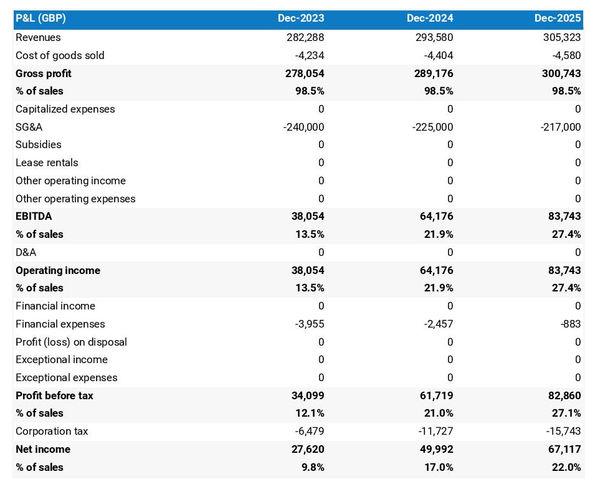
A healthy geological surveying firm's P&L statement should show:
- Sales growing at (minimum) or above (better) inflation
- Stable (minimum) or expanding (better) profit margins
- A healthy level of net profitability
This will of course depend on the stage of your business: numbers for an established geological surveying firm will look different than for a startup.
The projected balance sheet
Your geological surveying firm's forecasted balance sheet enables you to assess your financial structure and working capital requirements.
It is composed of three types of elements: assets, liabilities and equity:
- Assets: represent what the business owns and uses to produce cash flows. It includes resources such as cash, equipment, and accounts receivable (money owed by clients).
- Liabilities: represent funds advanced to the business by lenders and other creditors. It includes items such as accounts payable (money owed to suppliers), taxes due and loans.
- Equity: is the combination of what has been invested by the business owners and the cumulative profits and losses generated by the business to date (which are called retained earnings). Equity is a proxy for the value of the owner's stake in the business.
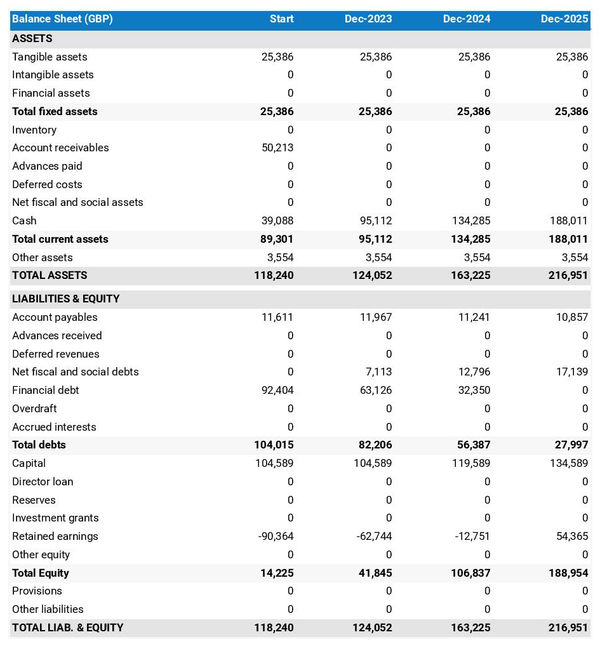
The projected cash flow statement
A projected cash flow statement for a geological surveying firm is used to show how much cash the business is generating or consuming.
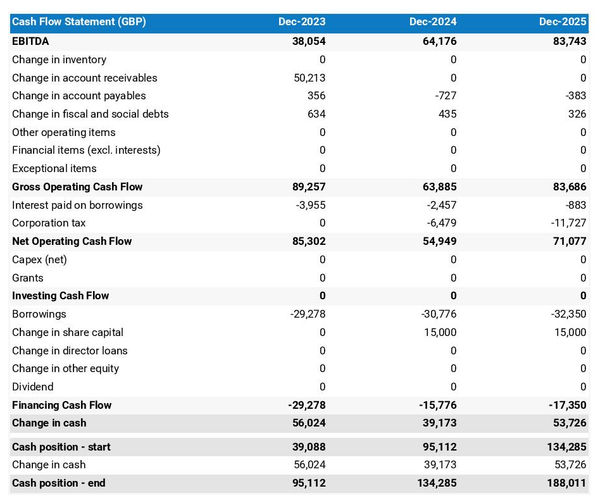
The cash flow forecast is usually organised by nature to show three key metrics:
- The operating cash flow: do the core business activities generate or consume cash?
- The investing cash flow: how much is the business investing in long-term assets (this is usually compared to the level of fixed assets on the balance sheet to assess whether the business is regularly maintaining and renewing its equipment)?
- The financing cash flow: is the business raising new financing or repaying financiers (debt repayment, dividends)?
Cash is king and keeping an eye on future cash flows is imperative for running a successful business. Therefore, you should pay close attention to your geological surveying firm's cash flow forecast.
If you are trying to secure financing, note that it is customary to provide both yearly and monthly cash flow forecasts in a financial plan - so that the reader can analyze seasonal variation and ensure the geological surveying firm is appropriately capitalised.
Need a convincing business plan?
The Business Plan Shop makes it easy to create a financial forecast to assess the potential profitability of your projects, and write a business plan that’ll wow investors.

Which tool should you use to create your geological surveying firm's financial forecast?
Using the right tool or solution will make the creation of your geological surveying firm's financial forecast much easier than it sounds. Let’s explore the main options.
Using online financial forecasting software to build your geological surveying firm's projections
The modern and easiest way is to use an online financial forecasting tool such as the one we offer at The Business Plan Shop.
There are several advantages to using specialised software:
- You can easily create your financial forecast by letting the software take care of the financial calculations for you without errors
- You have access to complete financial forecast templates
- You get a complete financial forecast ready to be sent to your bank or investors
- You can easily track your actual financial performance against your financial forecast, and recalibrate your forecast as the year goes by
- You can create scenarios to stress test your forecast's main assumptions
- You can easily update your forecast as time goes by to maintain visibility on future cash flows
- You have a friendly support team on standby to assist you when you are stuck
- It’s cost-efficient and much cheaper than using an accountant or consultant (see below)
If you are interested in this type of solution, you can try our projection software for free by signing up here.
Hiring a financial consultant or chartered accountant
Hiring a consultant or chartered accountant is also an efficient way to get a professional geological surveying firm financial projection.
As you can imagine, this solution is much more expensive than using software. From experience, the creation of a simple financial forecast over three years (including a balance sheet, income statement, and cash flow statement) is likely to start around £700 or $1,000 excluding taxes.
The indicative estimate above, is for a small business, and a forecast done as a one-off. Using a financial consultant or accountant to track your actuals vs. forecast and to keep your financial forecast up to date on a monthly or quarterly basis will naturally cost a lot more.
If you choose this solution, make sure your service provider has first-hand experience in your industry, so that they may challenge your assumptions and offer insights (as opposed to just taking your figures at face value to create the forecast’s financial statements).
Why not use a spreadsheet such as Excel or Google Sheets to build your geological surveying firm's financial forecast?
Creating an accurate and error-free geological surveying firm financial forecast on Excel (or any spreadsheet) is very technical and requires both a strong grasp of accounting principles and solid skills in financial modelling.
Most entrepreneurs lack the expertise required to create an accurate financial forecast using spreadsheet software like Excel or Google Sheets. As a result, it is unlikely anyone will trust your numbers.
The second reason is that it is inefficient. Building forecasts on spreadsheets was the only option in the 1990s and early 2000s, nowadays technology has advanced and software can do it much faster and much more accurately.
This is why professional forecasters all use software. With the rise of AI, software is also becoming smarter at helping us detect mistakes in our forecasts and helping us analyse the numbers to make better decisions.
Finally, like everything with spreadsheets, tracking actuals vs. forecasts and updating your forecast as the year progresses is manual, tedious, error-prone, and time-consuming. Whereas financial forecasting software like The Business Plan Shop is built for this.
Need a convincing business plan?
The Business Plan Shop makes it easy to create a financial forecast to assess the potential profitability of your projects, and write a business plan that’ll wow investors.

Use our financial projection templates for inspiration
The Business Plan Shop has dozens of financial forecast templates available.
Our examples contain a complete business plan with a financial forecast and a written presentation of the company, the team, the strategy, and the medium-term objectives.
Whether you are just starting out or already have your own geological surveying firm, looking at our financial forecast template is a good way to:
- Understand what a complete business plan should look like
- Understand how you should model financial items for your geological surveying firm
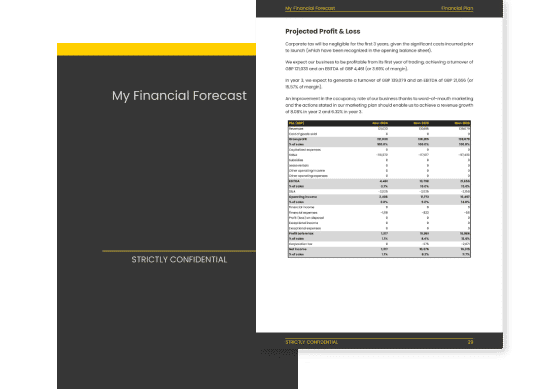
Takeaways
- A financial projection shows expected growth, profitability, and cash generation for your business over the next three to five years.
- Tracking actuals vs. forecast and keeping your financial forecast up-to-date is the only way to maintain visibility on future cash flows.
- Using financial forecasting software makes it easy to create and maintain up-to-date projections for your geological surveying firm.
You have reached the end of our guide. We hope you now have a better understanding of how to create a financial forecast for a geological surveying firm. Don't hesitate to contact our team if you have any questions or want to share your experience building forecasts!
Need a convincing business plan?
The Business Plan Shop makes it easy to create a financial forecast to assess the potential profitability of your projects, and write a business plan that’ll wow investors.

Also on The Business Plan Shop
- Example of financial projections
- How to create a turnover forecast for a business?
- Example of financial forecast for business idea
Know someone who runs or wants to start a geological surveying firm? Share our financial projection guide with them!



